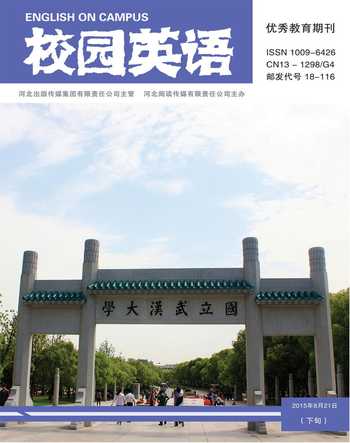“Wild Nights—Wild Nights!”:Passion for Love
【Abstract】One favorite subject of Emily Dickinson is love,which approximately 300 of her poems concern.This essay intends to analyze one of her love poems “Wild Nights—Wild Nights!”.In this short poem,the poet expresses her passion for love and shows the greatness of love through the employment of symbols and metaphors.
【Key words】passion for love; symbol; metaphor
Although Emily Dickinson lived reclusively most of her life,she wrote about love in many of her poems,through which readers can penetrate into her complicated and soft inner world.The following will be an analysis of her “Wild Nights—Wild Nights!”.Special attention will be paid to the poets idiosyncratic language use,including images,symbols and metaphors.
In the first stanza,in Line 1 “Wild Nights—Wild Nights!”,the poet attempts to catch readers attention through the repetition and capitalization of “Wild Nights”,and the uses of a dash and an exclamation mark.We can feel the strong emotion between the words and wonder at what those nights may be wild for.Usually,we associate the wildness of nights with its weather condition,such as the roaring wind and heavy rain in storms.But if we go on reading,we will find in the following lines that the wildness is associated with the speakers emotional state.From Line 2 to 4,“Were I with thee/ Wild Nights should be/ Our Luxury!”the speaker expresses her strong wish of staying together with someone known only to herself,and her imagination of utmost pleasure and happiness with each others company.Although the speaker does not point out whos the man she wants to be with,we can infer that “thee” may be her lover as the juxtaposition of “Nights” and “Luxury” here reminds people of amorous pleasure between passionate lovers.
In the second stanza,the speaker gives expression to the greatness of love.The conventional structure of Line 5 and 6 “Futile—the Winds-- / To a Heart in port” should be “The Winds (are)futile to a Heart in port”.Obviously,deviation here is intentionally employed by the poet to highlight the preposed adjective “futile”,thats to say,the futility of the winds to blow away the heart that has fixedly anchored in port.Usually,the port is associated with boats,here the poet compares the speakers profound affection for her lover from the bottom of “Heart” to a boat sailing in the “Winds”.Compasses and charts are of necessity for voyagers to keep on course, however,in Line 7 and 8,the speaker declares that the “Compass” and the “ Chart” are both unnecessary during the sea voyage when she is equipped with love.For the speaker,her love is so vehement as to conquer all.
In the last stanza,the speaker makes clear the wish of union with her lover.In Line 9 and 10,the poet compares herself to a boat and her lover to the “Sea”,and when the boat sails over the sea,the sea becomes “Eden” for the boat.Eden is the symbol of a place of complete bliss and delight and peace,and therefore the others acceptance of her love can bring her felicity as if living in Eden.Consequently,in Line 11 and 12,the speaker voices her strong desire to “moor” in the sea,which is suggestive of their physical and spiritual union.
Composed of three quatrains,this short and concise poem expresses Dickinsons longing for love and sense of belonging in spite of her reclusive life.The simple diction and economic expression generate profound meaning by dint of vivid images and ingenious formal innovation,Without mentioning the word of “love” once,she shows us the greatness of love with which we can overcome all obstacles and difficulties,and the felicity that the union of lovers can bring to each other,through the distinct symbols of the boat for the speaker herself and the sea for her lover,and the metaphor of Eden for a place of bliss.
References:
[1]Dickinson,E.(2010).Selected Poems and Letters of Emily Dickinson (Pu Long,Trans.).Jiangsu:Yilin Press.140.
作者簡介:袁飞,重庆大学外国语学院2014级硕士研究生,研究方向为英美文学。

